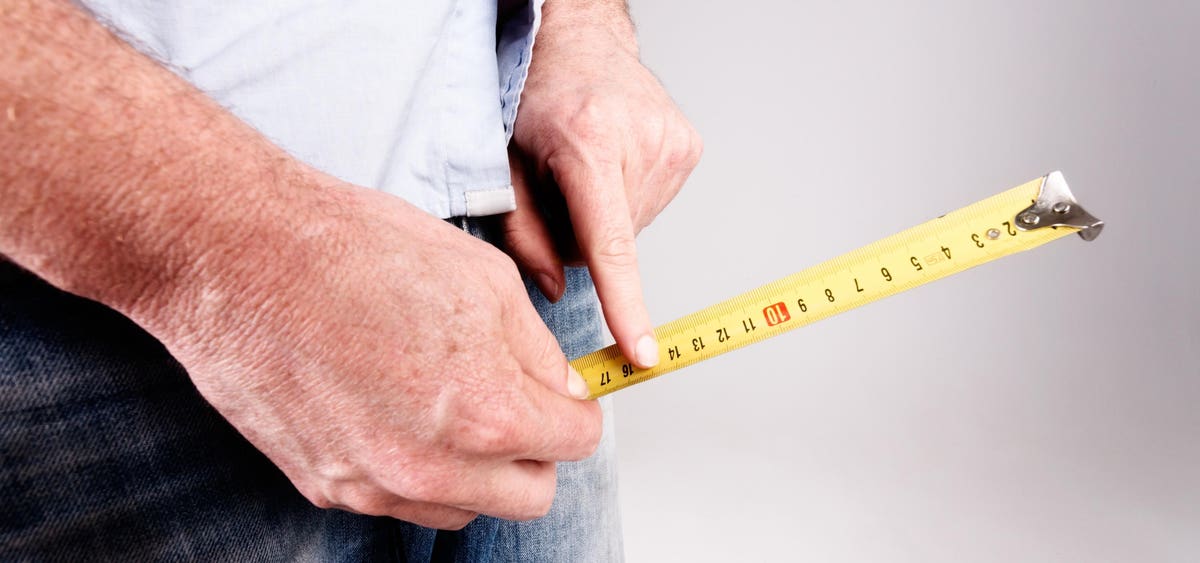Pills, lotions, oils, pumps, and surgeries – the options for men who are looking to add length to their penis are seemingly endless. Yet, given its sensitive nature, penis enlargement isn’t something that is openly discussed in society.
This is a recipe for disaster, especially when we consider these two facts about the world of penis enlargement:
Here are two reasons why men may feel the need to spend time, money and effort chasing an ideal that may ultimately leave them with more problems than solutions.
1. Psychosocial Factors Can Skew Perceptions of What a ‘Normal’ Penis Should Look Like
A 2019 study published in the Journal of Sexual Medicine suggests that a psychological condition called penile dysmorphophobic disorder, or PDD, may be widespread among men who opt for surgery to increase the girth of their penis.
Here are a few ways to tell if someone may be experiencing the symptoms of PDD, according to a 2020 study:
- They obsess over the size of their penis, despite it being in the normal range
- They compulsively seek medical attention or treatment options that promise to increase the size of your penis
- They experience considerable shame and distress related to their penis size
- They experience low levels of sexual satisfaction and high levels of sexual dysfunction
- In spite of these signs, their libido is unaffected
If this is you, understand that the actual size of your penis likely has little impact on the negative feelings you are experiencing. Those with PDD may, in fact, be better off working with a mental health practitioner who is trained to help them process these unhealthy patterns of behavior and thought rather than trying to augment the length and/or girth of their penis, which is unlikely to provide much relief to their distress.
The impact of social and cultural factors also cannot be ignored. A 2019 study conducted one-on-one interviews with 25 men who had previously undergone penis enlargement surgery to qualitatively understand the role culture and society played in their decision. Three major themes emerged:
- The influence of pornography. Observing larger-than-average penis sizes in internet pornography led many participants to believe they didn’t meet society’s definition of an acceptable penis size. Interestingly, this was true even when they understood that pornography employs tricks to make the penises of performers appear larger than they actually are.
- The influence of comparison with peers. Many of the participants interviewed reported that instances of comparison with peers (like in a locker-room setting) also caused them to feel unsatisfied with their size. As one participant put it, “Those who think they’ve got it, they flaunt it … so you’re always kind of comparing yourself to someone bigger really, aren’t you?”
- The influence of size-shaming in pop culture. Although none of the participants had personally experienced teasing about their size, they felt that jokes about penis size in popular media (often made by women) were emasculating and contributed to their own feelings of inadequacy.
2. A Misguided Understanding of What Makes Sex ‘Sexy’
A classic study published in the journal Psychology of Men and Masculinity analyzed the responses of over 50,000 heterosexual men and women to understand how each gender viewed penis size.
It was found that men who reported being larger than average were happier with their appearance, possibly due to their penis size. However, while only 55% of the men surveyed were reportedly satisfied with their penis size (with 45% wanting a bigger penis), the majority of women surveyed claimed that their partner’s size was adequate.
This brings us to a thought-provoking conclusion: Men may be overestimating the importance of the size of their penis in sexually satisfying their partner.
So, rather than focusing on something that you cannot control, like your penis size, investing time and effort in making sex more pleasurable for you and your partner is a more effective way to revitalize your sex life. Here are two tips that can help you build sexual intimacy with your partner:
- Build attractive habits outside the bedroom. A 2023 study published in the Archives of Sexual Behavior found that low sexual desire in women could be traced back to unequal division of chores around the house. According to the study, women who felt that the chores at home were unfairly divided felt that their partners were dependent on them, which reduced sexual desire.
- Understand that sex should feel like play, not work. “Men may be motivated to be sexually compliant due to motivations related to altruism, intoxication, sexual inexperience, peer pressure, popularity and sex-role concerns,” explains psychologist Cory Pederson, who co-authored a 2022 study published in Psychology and Sexuality that explored how stereotypical gender roles can cause heterosexual men to engage in consensual yet undesired sexual activity. Changing your mindset to be more mindful of pleasure can reduce the pressure to perform sexually or satisfy your partner, which is an effective tactic to switch the focus from your size to your enjoyment in the bedroom.
Conclusion
Our society’s framing of masculinity and the importance of size can skew perceptions and amplify feelings of inadequacy. Yet, research shows that the size of a man’s penis has less bearing on sexual satisfaction than factors like open communication, emotional intimacy, and understanding your partner’s sexual needs and desires. When you consider the potential harm that many enlargement treatments can cause to your sexual, mental, and physical health, the allure of such options quickly fades.
Read the full article here




